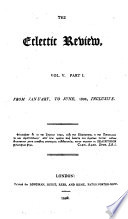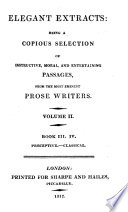 He was the man who of all modern, and perhaps ancient poets, had the largest and most comprehensive soul. All the images of nature were still present to him, and he drew them not laboriously, but luckily: when he describes anything, you more than see... He was the man who of all modern, and perhaps ancient poets, had the largest and most comprehensive soul. All the images of nature were still present to him, and he drew them not laboriously, but luckily: when he describes anything, you more than see...  A Thousand and One Gems of English Prose - Page 941872 - 534 pagesFull view A Thousand and One Gems of English Prose - Page 941872 - 534 pagesFull view - About this book
 | John Dryden, Walter Scott - 1808 - 432 pages
...them, in my opinion, at least his equal, perhaps his superior. * To begin then with Shakespeare. He was the man who of all modern, and perhaps ancient...them not laboriously, but luckily : when he describes any thing, you more than see it, you feel it too. Those who accuse him to have wanted learning, give... | |
 | William Shakespeare - 1809 - 390 pages
...the reading was yet not rectified, nor his allusions understood; yet then did Dryden-pronounce, "that Shakspeare was the man, who, of all modern, and perhaps...them not laboriously, but luckily: when he describes any thing, you more than see it, you feel it too. Those, who accuse him to have wanted learning, give... | |
 | William Shakespeare - 1809 - 394 pages
...was yet not rectified, nor his allusions understood; yet then did Dryden pronounce, " that Shakspenre was the man, who, of all modern, and perhaps ancient...them not laboriously, but luckily: when he describes any thing, you more than see it, you feel it too. Those, who accuse him to have wanted learning, give... | |
 | 1809 - 604 pages
...still present to him, and he drew them not laboriously, but luckily : when he describes any thing, you more than see it — you feel it too. Those who...learned ; he needed not the spectacles of books to read nature ; he looked inwards, and found her there. 1 cannot say he is every where alike ; were he... | |
 | William Shakespeare - 1811 - 510 pages
...reading was yet not rectified, nor his allusions understood ; yet then did Dryden pronounce, " that Shakspeare was the man, who, of all modern and perhaps...them not laboriously, but luckily : when he describes any thing, you more than see it, you feel it too. Those, who accuse him to have wanted learning, give... | |
 | Hugh Blair - 1811 - 400 pages
...character which Dryden has drawn of Shakespeare is not only just, but uncommonly elegant and happy. / " He was " the man, who, of all modern, and perhaps ancient...nature were still present to him, and he drew them not labo" riously, but luckily. When he describes any thing, you more " than see it ; you feel it too.... | |
 | Elegant extracts - 1812 - 310 pages
...and only Mr. Waller among .the English. Dryden. REMARKS ON SOME OF THE UEST ENGLISH DRAMATIC POETS. SHAKSPEARE was the man who, of all modern and perhaps...he drew them not laboriously, but luckily : when he describe any thing, you more than see it, you feel it too Those who accuse him to have wanted learning,... | |
 | William Shakespeare - 1810 - 436 pages
...still firesent to him, and he drew them not laboriously, but luckily': -when he describes any thing, you more than see it, you feel it too. Those, who...learned : he needed not the spectacles of books to read nature ; he looked inwards, and found her there. I cannot say he is every where alike ; were he... | |
 | John Adams - 1813 - 324 pages
...character which Dryden has drawn of Shakespeare, is not only just, but uncommonly elegant and happy. " He was the man, who of all modern, and perhaps ancient...them not laboriously, but luckily. When he describes any thing, you may then see it ; you feel it too. They who accuse him of wanting learning, give him... | |
 | John Aikin - 1814 - 662 pages
...is so ample and judicious, that it renders further commendation superfluous. " Shakespear (says he) was the man who, of all modern, and perhaps ancient...them not laboriously, but luckily. When he describes any thing, you more than see it, you feel it too. He needed not the spectacles of books to read nature... | |
| |